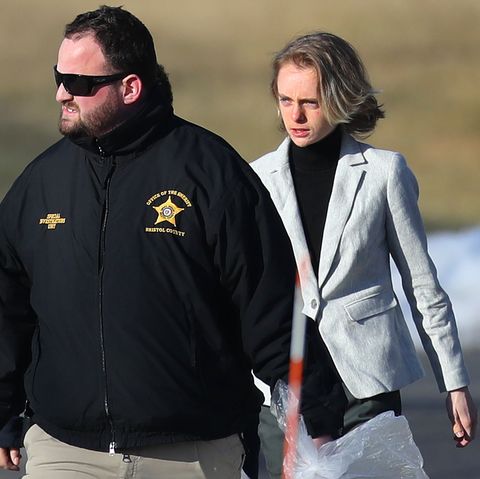On July 13, 2014, authorities discovered the body of 18-year-old Conrad Roy III in his pickup truck, parked outside a Kmart in Fairhaven, Massachussetts.
The honor roll student, who struggled with social anxiety and depression, had killed himself by attaching a hose from a portable generator and filling his car’s cab with carbon monoxide.
In the weeks leading up to his suicide, Roy exchanged several texts with his 17-year-old long-distance girlfriend, Michelle Carter, who encouraged him to end his life. “You keep pushing it off and say you’ll do it but u never do. It’s always gonna be that way if u don’t take action,” she reportedly texted him on the day he died.
The 2019 HBO documentary, I Love You, Now Die: The Commonwealth v. Michelle Carter, took an in-depth look at the now-infamous case, which raised national questions about mental health—and whether one teen can be held responsible for the suicide of another. It featured interviews with Roy’s family, Carter’s lawyer, key witnesses, and journalists who covered the story and ensuing trial. Three years later, Hulu is debuting a dramatized version of the events in the streaming series The Girl from Plainville, starring Elle Fanning as Carter.
Carter was convicted of involuntary manslaughter in 2017. She was released early from prison, after serving only 11 months of her 15-month sentence at the Women’s Center at the Bristol County House of Corrections.
Here’s everything you need to know about the case.
This content is imported from YouTube. You may be able to find the same content in another format, or you may be able to find more information, at their web site.
Carter and Roy met in 2012. Both had struggled with mental illness.
Although they lived just an hour apart—Roy in Fairhaven, and Carter in Plainville—most of their communication was via phone call, email, and text. They only met in person five times. They met while on vacation to Florida with their respective families.
Both struggled with depression, and Roy had previously attempted to kill himself. In February 2015, seven months after Roy ended his life, Carter was indicted on charges of involuntary manslaughter. Her trial was covered by nearly every major news outlet—and a photo of her in court even landed on the cover of People.
Carter allegedly urged Roy to kill himself—and sent step-by-step instructions on how to do it.
In dozens of text messages that came to light during the trial (more can be found here), Carter pushed Roy to end his life—and continued to do so when he hesitated:
CARTER: I think your parents know you’re in a really bad place. I’m not saying they want you to do it but I honestly feel like they can accept it. They know there is nothing they can do. They’ve tried helping. Everyone’s tried, but there is a point that comes where there isn’t anything anyone can do to save you, not even yourself. And you’ve hit that point and I think your parents know you’ve hit that point. You said your mom saw a suicide thing on your computer and she didn’t say anything. I think she knows it’s on your mind and she’s prepared for it. Everyone will be sad for a while but they will get over it and move on. They won’t be in depression. I won’t let that happen. They know how sad you are, and they know that you are doing this to be happy and I think they will understand and accept it. They will always carry you in their hearts.
ROY: Aww. Thank you, Michelle.
CARTER: They will move on for you because they know that’s what you would have wanted. They know you wouldn’t want them to be sad and depressed and be angry and guilty. They know you want them to live their lives and be happy. So they will for you. You’re right. You need to stop thinking about this and just do it because over turning always kills, over thinking.
ROY: Yeah, it does. I’ve been thinking about it for too long.
CARTER: Always smile, and, yeah, you have to just do it. You have everything you need. There is no way you can fail. Tonight is the night. It’s now or never.
She provided step-by-step instructions via text message about exactly what he should do:
CARTER: Yeah, it will work. If you emit 3200 ppm of it for five or ten minutes you will die within a half hour. You lose consciousness with no pain. You just fall asleep and die. You can also just take a hose and run that from the exhaust pipe to the rear window in your car and seal it with duct tape and shirts, so it can’t escape. You will die within, like, 20 or 30 minutes all pain free.
Although Carter’s defense acknowledged these texts with Roy, her lawyers argued that prosecutors “cherry-picked” them, and ignored ones from Carter encouraging Roy to seek help.
A judge found her guilty due to a “failure to act” in June 2017.
According to NBC Boston, during the trial, Carter’s lawyer argued that she actually tried to talk Roy out of ending his life, and instead encouraged him to get help. Her attorney claimed nothing Carter did could have changed Roy’s determination to kill himself.
It was concluded that Carter had a “duty to alleviate the risk.” This alleged failure “caused the death of Mr. Roy,” and she was found guilty of involuntary manslaughter.
According to People, the judge who announced her conviction, Judge Moniz, explained what ultimately led to her conviction: “Carter’s actions and also her failure to act where she had a self-created duty to Mr. Roy, since she had put him in that toxic environment, constituted each and all wanton and reckless conduct,” he said.
“She [instructed] Mr. Roy to get back into the truck, well-knowing of all of the feelings that he [had] exchanged with her: his ambiguities, his fears, his concerns,” he added.
“She did nothing. She did not call the police or Mr. Roy’s family. Finally, she did not issue a simple additional instruction [to Roy]: ‘Get out of the truck.’ ”
After Roy’s body was discovered, Carter reportedly texted a friend and confessed to her role in his death.
“I could have stopped it,” she wrote, according to People. “I was on the phone with him and he got out of the car because it was working and he got scared and I [expletive] told him to get back in.”
Carter was sentenced to 15 months in jail for her role in Roy’s death.
In February 2019, the Massachusetts state supreme court denied her appeal, and a judge ordered Carter, then 20 years old, to begin serving her sentence, per CNN. She was sentenced to two and a half years in jail and is serving 15 months in the Bristol County House of Correction—the rest was suspended. According to NBC News, Carter “showed no emotion as bailiffs took her away.”
“It’s been four and a half years since Conrad passed. Our heart has been broken this whole time,” Roy’s aunt, Becky Maki, reportedly said on the family’s behalf. “It’s been hard to live out the details of his death over and over again. It’s something that hasn’t left our mind…I hope that no one else ever has to feel this pain. His life mattered. It mattered to us and I think it mattered to a lot of people. Conrad, we love you.”
Carter’s lawyer told People that his client regretted her actions.
“I suggest that she is not a danger to the public and in the juvenile system, probation is appropriate,” he told the outlet. “A lot of what has been reported thus far is that Michelle Carter always wanted to endorse Conrad Roy’s plan to kill himself. But it will be abundantly clear that for weeks prior to agreeing to his plan, she tried to talk him out of it, and he tried to get her to commit suicide with him.”
According to NBC Boston, Carter is “assimilating very well,” to life behind bars. Bristol county Sheriff Thomas Hodgson told the outlet that she seemed “reserved and quiet.” In her first week in jail, she reportedly checked out a book from the library and even had a visitor.
Carter’s lawyers petitioned the U.S. Supreme Court to take up her case.
“Michelle Carter did not cause Conrad Roy’s tragic death and should not be held criminally responsible for his suicide,” her attorney, Daniel Marx of the Boston law firm Fick & Marx LLP, told Quartz. “This petition focuses on just two of the many flaws in the case against her that raise important federal constitutional issues for the US Supreme Court to decide.”
On January 13, 2020, the Supreme Court said it would not take up the appeal, leaving her conviction intact.
She was released from prison early.
Carter was photographed leaving Bristol on January 23, 2020 just one week after the Supreme Court rejected her appeal to hear the case. She wore a light grey blazer over a black turtleneck, and was accompanied by jail officials who carried her belongings in large, clear garbage bags. They escorted her to a waiting car.
According to Buzzfeed News at the time, she earned enough “good time” to get out early. She was released after serving only 11 months of her 15-month sentence.
“Ms. Carter has been a model inmate in Bristol County,” Jonathan Darling, a spokesperson for the Bristol County Sheriff’s Office, told the outlet. “She has attended programs, had a job inside the jail, has been polite to our staff and volunteers, has gotten along with other inmates, and we’ve had no discipline issues with her whatsoever.”
Carter’s probation ends on Aug. 1, 2022, Associated Press reported. She cannot make with Roy’s family or profit from her story during that time. In that case, it seems Carter will not be getting a check from Hulu for The Girl in Plainville.
This content is created and maintained by a third party, and imported onto this page to help users provide their email addresses. You may be able to find more information about this and similar content at piano.io



